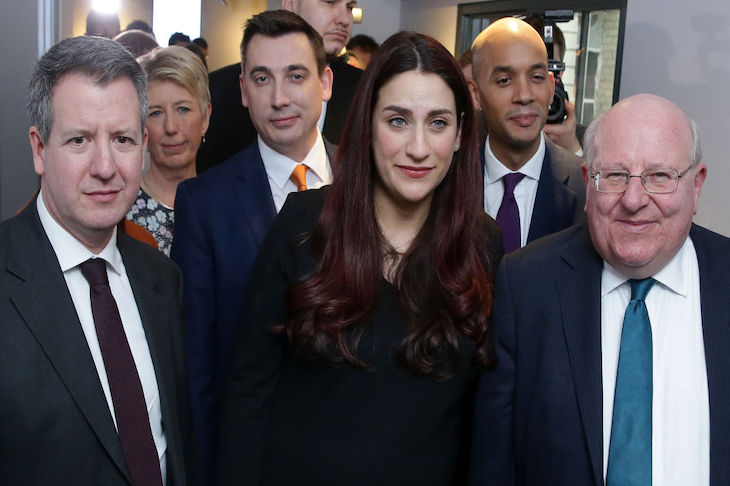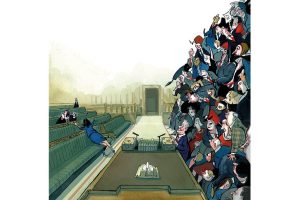The first thing to note is that it’s not about policy. The not-so secret seven Members of Parliament who left Britain’s Labour party this morning have not changed their policy preferences. They have not become Tories. Nor have they even become liberals. They could, with little difficulty, endorse much of the Labour party’s 2017 manifesto without compromising themselves in the slightest.
Because this break, this rebellion, this journey into exile, is not about policy. It is about character and values and so many of the other things the Labour party believes it holds dear to the extent it often behaves as though it thinks it owns a monopoly on these things. And the chief message from this more-in-sorrow-than-in-anger departure is that these seven – who are really eight, if the Barrow MP John Woodcock is included – do not believe Jeremy Corbyn is a fit and proper person to be prime minister of the United Kingdom of Great Britain and Northern Ireland.
They may not be alone in that. The most recent YouGov poll on this question reported that just one in five voters thinks Corbyn would make a better prime minister than Theresa May. Let that sink in. At a time of political crisis and faced with the weakest, most divided, government many of us can remember, the leader of the opposition is weighed against a ruinously unpopular Prime Minister and still found grievously wanting. The public have seen enough; they know he’s not up to it. And not even happy-clappy promises to nationalize the trains can change that.
I do not know if there will be a second wave of defections later this week, though I know that if I were planning this kind of rebellion I would have organized matters so there would be, holding some pledges of allegiance back for a second round, the better to build – if you will forgive me here – momentum.
I do know there are plenty of other Labour MPs who do not think Jeremy Corbyn should become Prime Minister. Again, this is a question of values and personnel. The Labour leader surrounds himself with people who believe the party took a wrong turning decades ago. They, not the gang of seven, are the extremists and the real splitters here. A Labour party that could once accommodate Jeremy Corbyn can no longer accommodate Luciana Berger. That is no small thing, no minor change.
But then how could it be otherwise when the Labour party is now run by people who have spent most of their adult lives disliking the Labour party and reserving greater than usual dollops of contempt for Labour politicians who think winning elections should be a vital part of the Labour party’s business? Labour has been seized by a far-left faction. One need only look at those close to Corbyn to see the extent of this. Seumas Milne? A longstanding explainer of the virtues of East German communism. Andrew Murray, one of Corbyn’s closest advisers, was until two years ago a lifelong member of the Communist party. Len McCluskey is Len McCluskey. These people are not your usual social democrats; they are not even your usual socialists. And they are the people running the Labour party now.
To that end, the independent group is really a plea for normality and a cry for something approaching sanity. Again, this is not a question of policy but one of style and attitude and culture. Plenty of other Labour MPs appreciate this and have some sympathy for the seven. When Tom Watson – the party’s deputy leader for heaven’s sake – says he thinks ‘our colleagues have come to a premature conclusion’ you know something is up. That is, the seven have reached the right conclusions even if they have acted in the wrong way.
That in turn offers a way back. This is not, or at least not yet, a breaking of the mould or a recasting or realignment of British politics. A normal Labour party led by a normal leader could easily welcome the seven back into the family. The seven have not, as they see it, left Labour; Labour has left them. If normality were to return, so would they.
This may not happen quickly. But if nothing else the seven have today given other MPs reason to voice their own doubts and their courage – for this is a courageous move given the temper of British politics right now – may yet inspire others, who have kept their counsel for too long, to find their voices too. In that sense, they have done Labour a service today.
That service may yet be matched by some on the Conservative benches equally aware of the manner in which their party is likewise threatened by a hostile internal takeover in which the prudent values and sympathies of traditional Toryism are imperiled by a reckless, damaging, thirst for radical ideological purity.
One thing above all, however, is clear. When the country is ill-served by its government it requires to be well-served by the opposition. That is the necessary check, the required balance, the system depends upon. At present no such check, no such balance, exists and that, as much as anything else, helps explain the predicament, the mess, in which we find ourselves. Good Tories need a good Labour party and vice versa. Today’s events have been a reminder that this party does not, at the present time, exist. It is a question of saving Labour from itself and that is something in which even people who are not Labour supporters have a keen interest though they may not always recognize it.
If this is a correction, or even just the start of one, it is one that is overdue. Something similar may yet be needed for the Conservative party too.
This article was originally published on The Spectator’s UK website.


















